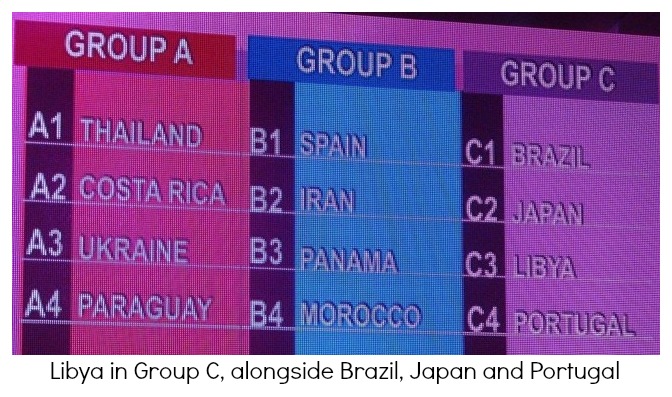By Mohamed Assed.
Tripoli, 26 August:
Football fanatics around the world . . .[restrict]were excitedly awaiting the official draw of the FIFA Futsal World Cup Thailand 2012. The draw was held last Friday in Bangkok.
This year’s event will be held from 1-18 November as two Thai cities, Bangkok and Nakhon Ratchasima are readily prepared to host the tournament’s games. It is the seventh hosting of the tournament as 24 countries split into six groups are poised to compete. Like the FIFA World Cup, the tournament is held every four years. However, the 2nd edition of the competition in 1992 (hosted by Hong Kong) was an exception to the rule as it was organized three years after the 1st edition in 1989 (hosted by the Netherlands).
Reigning Futsal African champions Libya, were drawn into a tough group (group C) with quadruple Futsal world champions Brazil, Asian Futsal champions, Japan and strong European side, Portugal.
Libya, alongside Egypt, is considered Africa’s toughest side in Futsal. Although Libya’s 11-a-side football has been in general wane over the course of the last four decades, the futsal team clearly tops the Arab and African nations. Libya’s futsal team is the reigning African and Arab champion. The team won the African Cup of Nations once in 2008 when Libya hosted the tournament, finished third in the African Cup of Nations of 2000 in Egypt, ranked third in the Al-Fateh Confederations Cup in 2009 in Tripoli, ranked second in the Mediterranean Futsal Cup in 2010, and won the Arab Futsal Championship twice, in its last editions, 2007 and 2008.
In addition, Libya finished in fourth and third positions in the 2005 and 1998 Arab Futsal Championship editions, respectively. The Libyan Futsal team is currently the best-ranked African and Arab side, ranking 25th worldwide (as of 16 July 2012).
This is Libya’s second appearance in a FIFA Futsal World Cup. The first appearance was four years ago, when Rio de Janeiro hosted the 2008 edition. Libya was drawn into group D with then-reigning champions Spain, Asian representatives Iran, the Czech Republic and Uruguay. The Libyans lost 3 games (0-3 to Spain, 2-4 to Iran and the Czech Republic) and drew one (3-3 with Uruguay), picking up an orphan point and crashing out of the tournament early on.
The lads of Pablo Prieto Perille, Libya’s coach, will be looking to show their colours and live to their potent African and Arab reputation in Thailand later on this year, and maybe recording a first win in a FIFA Futsal World Cup. All they have to do is pick up the pieces from their last disappointing turnaround in the competition, get enthused by Libya’s 11-a-side football team’s recent heroics in the Arab Cup, and things might not be so bad anyway.
Brazil, Japan and Portugal… A murky path for the Mediterranean Knights
Brazil has never missed out in any of the previous tournaments, and almost played in all final matches, missing out in only one occasion, Chinese Taipei 2004. Alongside double Futsal world champions Spain, the Brazilians are considered a dominant force in this year’s event. However, the Seleção are highly regarded by football fans as hot favourites to clinch their fifth title.
Japan is also considered a hot ticket in Group C and is to be closely watched throughout the tournament. So far, Japanese football in general has been a saga of incessant improvement, and the Nippon Futsal side is no exception to the rule. Having lost all their games in the first edition of the competition in 1989, the Japanese picked up the pieces from then and developed their game. In the FIFA Futsal World Cup of 2004, they managed to secure an upright point when they drew their last game with the USA, 1-1.
Four years later, the Japanese showed their colours as they proved competitive and managed to record two convincing wins over both Cuba and the Solomon Islands. European side Portugal will be looking to erase their disappointing participation four years ago in Brazil when they failed in the first hurdle. The Lusitanian side’s appearance in the Far East this year will be their fourth, consecutively. The team mates of Joao Benedito are eager to replicate their best feat in the competition in Guatemala 2000, where they finished third. [/restrict]






